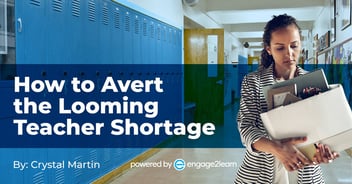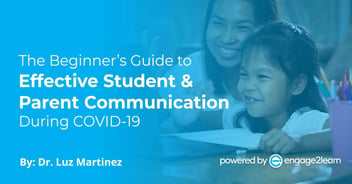The MOST Critical Move to Strategically Support Overwhelmed Teachers | engage2learn
Under normal circumstances, providing strategic support to teachers is just flat out hard. But providing meaningful, intentional support that is right for each individual during significant change and uncertainty can easily feel like an impossible feat. Significant changes are happening right now not just in the education arena but all over the world, and for a variety of reasons, such as massive changes to the way learning is delivered due to a worldwide pandemic, social unrest, and a sense of economic gloom and doom.
The key to solving this crucial riddle is an intentional focus on Teacher Self-Efficacy.
Professor Albert Bandura defines self-efficacy as “belief in one’s agentive capabilities, that one can produce given levels of attainment.” In other words, self-efficacy is our self-perceived belief in our ability to succeed in any given situation. The title of this blog alludes to a specific time that we, as educational leaders, should be focused on strategically supporting teachers (now). However, the reality is that there is not a specific time that we should focus on a teacher’s belief in his or her ability to impact students’ lives; we should ALWAYS focus on doing anything and everything in our power to pour into this system of belief. It is THAT IMPORTANT.
Due to the various crises at hand, it’s easy to lose sight of the importance of teacher self-efficacy and even easier, with all of the logistical challenges that come with significant disruption, to behave in such a way that actually reduces a teacher’s belief that he or she can succeed. Providing coaching support is a key strategy that builds a teacher’s sense of self-efficacy and effectiveness.
Often, it is proclaimed that the education profession is slow to change and the reason for this impossibly slow change process is a human-centered resistance to change that is derived from fear; as in, educators are afraid of change. According to Ronald Heifetz in his book, The Practice of Adaptive Leadership: Tools and Tactics for Changing Your Organization and the World, the real culprit for the resistance educators exhibit to change is actually a fear of loss; loss of capacity, loss of routine, loss of agency, etc. Naturally, as humans are prone to do, educators resist situations that make them feel like they have lost something; they have lost their ability to feel effective. This loss of feeling effective is normal anytime you try something new, and if you feel you have personally lost effectiveness, it’s also normal to lose the sense of belief that you can be successful in the endeavor you’re facing. This is what educators resist; the sense of loss of effectiveness that comes from change, and the resulting loss of self-efficacy that they can be successful with students.
During the last nine years, engage2learn has strategically supported thousands of educators (teachers, coaches, leaders) with coaching. Their stories are often very similar. They initially feel trepidation and may seem negative or resistant, but with each coaching conversation we, the coaches, get to see an amazing transformation. We are a part of the story where we get to see their demeanor change, their excitement increase, and their hunger to continue to improve skyrocket. There are so many stories where in the end, the educator receiving the coaching is thankful and confident and subsequently much more effective, partly because they’ve learned new skills but primarily because they believe now because of their new skills and the support they’ve received they can be successful!
As leaders, we have the power to provide the needed intentional support to teachers during times of significant disruption that mitigates this feeling of loss and the reduction of self-efficacy. However, we have to intentionally focus on this effort, along with the onslaught of other decisions and issues that require our attention. As a result, it’s easy to understand how supporting a teacher’s sense of self-efficacy falls by the wayside.
Importance of belief & sense of Teacher Self-Efficacy
Whether you think you can or think you can’t, you’re right.”
~Henry Ford
Why does any of this even matter? Clearly, all educational leaders share the desire to have high-performing education systems for the children in their communities. Everyone agrees that topics like student achievement, equity, social-emotional learning, and teacher professional learning are all important. There’s a fairly universal agreement that teacher effectiveness is critical, but it may be underestimated just how critical it is. Research shows that teachers are estimated to have two to three times the effect of any other school factor on student performance. This effect is greater than services, facilities, and even leadership. We don’t often consider, however, the impact that a teacher’s self-efficacy has on his or her individual effectiveness, and as leaders, we absolutely should consider this critically important idea. A teacher’s belief about his or her ability to succeed with his or her students matters…a lot! In fact, a study in The Elementary School Journal (ESJ, September 2012) determined that teacher self-efficacy had more of an impact on literacy outcomes than teacher experience or teacher education.
Belief about one’s self-efficacy can create, as Jim Collins describes in a different context in his book Good to Great, either a doom loop or a positive flywheel effect. If teachers have a high sense of self-efficacy, they believe they can be successful with the kids in their class. As a result, they’re more likely to use highly effective teaching best practices and will be more likely to persist when lessons don’t go as planned or when they encounter difficult-to-teach students. They are also more likely to continue to strategize new and innovative ways to reach all students. The more they do these things, the more success they are likely to have. The more success they have, the more they believe they can have success in the future, and thus the positive flywheel is born.
The opposite is also possible if teachers have a low sense of self-efficacy. They are likely to exert only minimal effort in the classroom and the strategies used will center more on the management of students instead of high-yield engagement. Teachers can easily fall into the doom loop in this scenario as these efforts in the classroom rarely if ever, yield positive results. As teachers experience difficult situations, they are more likely to rapidly throw up their hands in defeat and fall into the mindset of simply surviving the day. This doom loop experience significantly reduces a teacher’s sense of self-efficacy, and no amount of training or evaluation can overcome this loss to break the doom loop cycle. This persistent doom loop effect can result in lower student achievement and engagement, increased student disciplinary situations, and higher teacher attrition rates.
Here’s the MOST critical move we can make to improve teacher self-efficacy
In the context of the rapidly changing conditions of this particular time in history, it is easy to think that there are just more important things to think about and plan for than teachers’ self-efficacy or the collective self-efficacy of a campus or district. The reality is that supporting a teacher’s belief about his or her ability to succeed isn’t that complicated or difficult. Providing coaching support is a key strategy that builds a teacher’s sense of self-efficacy and effectiveness.
In just over two week, everything changed in education. We heard from many districts that they didn’t want to add anything more to a teacher’s plate. The reality is that what they need most is for someone to provide the personalized support necessary to navigate these rapid changes, and the resulting loss of capacity teachers were feeling; they were being asked to do things they had never done before. It doesn’t have to be a pandemic that causes change. It could be any change through which your district is moving. Providing coaching helps build an individual sense of self-efficacy needed to develop the skills required to be effective in the new context.
All across the nation, educational professionals are looking for the “right answer” to support the systems they serve. Coaching is that answer. Not sure you can provide coaching to everyone? Focus on new teachers with zero to three years of experience. This is a crazy time to be at the beginning of a career, so consider providing them with additional support so that our average rate of attrition from the profession for this group doesn’t climb even higher than the current 50%. Don’t have many new teachers? Start with a grade level or a content area. The point is you have to start. If you want to truly make a difference for the kids that you serve, provide the personalized support that the teachers working with them every day need to develop their personal belief and sense of self-efficacy. Just start and watch as over time, great things happen for everyone in the organization and, ultimately, in the community that is served. Just start.
I remember being both a campus and district administrator charged with the responsibility of providing the right support at the right time and in the right way. It can be overwhelming, especially in these unprecedented times. If you find yourself in that category, some level of overwhelmed by the challenge facing you; here are three easy steps you can take:
- Focus on your new, 0-3 years experience, teachers, and provide additional support through our New Teacher Coaching service.
- Check out the resources on our 20-21 Instructional Plan for Reopening Schools page for tools you can use today to support your teachers.
- Identify the positions you have available that you could leverage to provide intentional support directly to teachers. Think Librarians, Content Coordinators, Assistant Principals.



